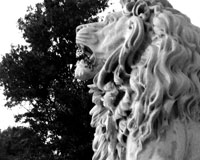
What is the corn?
Midwestern fields are not our own—
as prairies were not the settlers’—
but belong to the neighbors,
whose arrowhead collection
suggests otherwise. Let’s
part the stalks as if they’re coats
in the wardrobe. Let’s enter Narnia,
the past, not college, when the prairie
preserve was for talking the post-
colonial talk, then conquering
a date’s body in our country’s
fuzzy bellybutton and pilfering
Indian grass and big bluestem
to adorn a corner of my dorm room,
but farther back, when over the New
World’s heart was a cosmos-
worth of green-gold grass, wholly holy,
Elysian. Nothing can promise
time won’t replace our own person’s
most distinct, intrinsically precious
feature (all but one percent)
with what is sold, eaten. Odd dinners
occurred at the aforesaid neighbors’
table. Mannequins, the grandmother’s,
dined with her. When police
arrived at her request, she pointed
to the doll with red skin and said, “He’s
not welcome here!” They, at magic
hour worthy of Terrence Malick,
ought to come along. To the past?
To a place that beckons, “Yes, on was,
is, more than muse.” To where we,
like Chekhov’s student, touch one
end of time, make the other quiver;
feel “truth and beauty” and “lofty
meaning” at the heart of “all earthly
life”; find Whitman loitering in the tall-
grass, stopped waiting for us, leaning
against a trunk yet to be a witness tree.
Nathanael Tagg is the author of two poetry collections: Animal Virtue and Green Jesus—the former published by WordTech Editions in 2018, the latter to be released by them in May 2021. He is also an associate professor of English at Cecil College. He has an MFA from Rutgers, where he was a Truman Capote Literary Trust fellow. His poems and reviews appear in various magazines, including Colorado Review, Barrow Street, Pleiades, Confrontation, and Cimarron Review. He and his wife live with their daughter, a toddler, in Lancaster, PA. Learn more at www.nathanaeltagg.com.

